CORPORATE ACTION
Coca-Cola, PepsiCo, And Nestlé World’s Top 3 Plastic Polluters For Three Straight Years
#BreakFreeFromPlastic, the global alliance of organizations calling on brands to drastically reduce single-use plastic, released its 2020 Brand Audit report in December 2020. The report, which crowdsources information on plastic waste worldwide to determine which brands are to blame, showed a lack of significant progress made by leading brands compared with previous years. Also, there is no evidence of any decrease in manufacture of single-use plastic.
Coca-Cola was ranked the world’s number one plastic polluter, with the brand’s beverage bottles the most frequently found discarded, on litter sites like beaches, rivers, and parks, in 51 of 55 countries covered by the survey. PepsiCo and Nestlé were also in the top three. Of the 346,494 pieces of plastic waste, 63% came with a clear mark of a consumer brand.
The findings broadly tally with plastics use data released by Ellen MacArthur foundation last month. It found that the three largest users of plastic were, in order, Coca-Cola, PepsiCo and Nestlé. Data shows Coca-Cola’s plastic use rose from 2,970,289 tonnes to 2,981,421 tonnes (+0.37%), PepsiCo’s was unchanged at 2,300,000 tonnes and Nestlé’s fell from 1,700,000 tonnes to 1,524,000 tonnes (down 10.35%).
In response to our question by email, Nestlé informed us that “These reductions were achieved through a combination of factors, such as the use of alternatives to PP, light weighting, and portfolio shifts”.
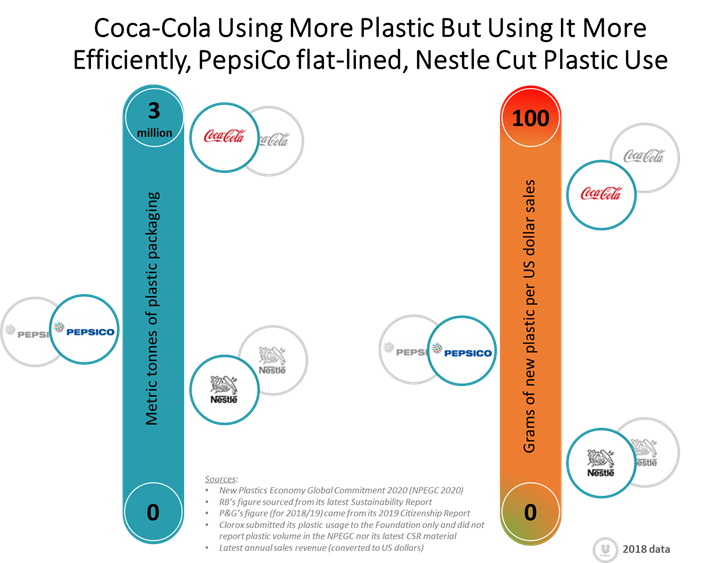 [Image Credit: © Business360]
[Image Credit: © Business360]
Coca-Cola was ranked the world’s number one plastic polluter, with the brand’s beverage bottles the most frequently found discarded, on litter sites like beaches, rivers, and parks, in 51 of 55 countries covered by the survey. PepsiCo and Nestlé were also in the top three. Of the 346,494 pieces of plastic waste, 63% came with a clear mark of a consumer brand.
The findings broadly tally with plastics use data released by Ellen MacArthur foundation last month. It found that the three largest users of plastic were, in order, Coca-Cola, PepsiCo and Nestlé. Data shows Coca-Cola’s plastic use rose from 2,970,289 tonnes to 2,981,421 tonnes (+0.37%), PepsiCo’s was unchanged at 2,300,000 tonnes and Nestlé’s fell from 1,700,000 tonnes to 1,524,000 tonnes (down 10.35%).
In response to our question by email, Nestlé informed us that “These reductions were achieved through a combination of factors, such as the use of alternatives to PP, light weighting, and portfolio shifts”.
 [Image Credit: © Business360]
[Image Credit: © Business360]
CORPORATE ACTION: L’Oréal
L’Oréal Launches Garnier Line Of Earth-Friendly Shampoo Bars In Europe
.jpg&width=250&height=249)
L’Oréal has launched a new line of Garnier shampoo bars for the European market. Garnier shampoo bars will be 94% plant-based and biodegradable, with 80% less packaging and needing 70% less fossil energy to make. The bars will come packaged in recyclable cardboard, targeting customers with different types of hair, and will come with scents, including coconut, oat, and ginger.[Image Credit: © Garnier LLC]
CORPORATE ACTION: Nestlé
Nestlé Offers Nesquik, Ricoré Drink Brands and Chocapic Bio Cereals In Reusable Containers
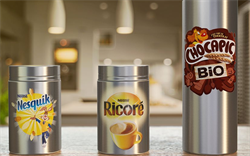 Nestlé has partnered with French retailer Carrefour and recycling management company Loop to offer reusable containers for its Nesquik cocoa powder, Ricoré chicory and coffee drink, and Chocapic Bio cereals. Consumers can purchase the Nestlé products through Carrefour’s e-commerce delivery platform and, by end of the year, through the retailer’s online stores. Empty containers are either collected from the consumer’s home or dropped off at Carrefour stores. After the containers are cleaned and refilled, they are put back into Loop platform’s circular system.[Image Credit: © Nestle]
Nestlé has partnered with French retailer Carrefour and recycling management company Loop to offer reusable containers for its Nesquik cocoa powder, Ricoré chicory and coffee drink, and Chocapic Bio cereals. Consumers can purchase the Nestlé products through Carrefour’s e-commerce delivery platform and, by end of the year, through the retailer’s online stores. Empty containers are either collected from the consumer’s home or dropped off at Carrefour stores. After the containers are cleaned and refilled, they are put back into Loop platform’s circular system.[Image Credit: © Nestle]
CORPORATE ACTION: Procter & Gamble
P&G Plans To Start Using HDPE Tubes For Crest, Oral-B, and Blend-a-med Toothpaste Brands
 Procter & Gamble plans to start switching to recyclable high-density polyethylene (HDPE) tubes for its Crest and Oral-B toothpaste brands in the US and Blend-a-med in Europe in January 2021, a process it expects to complete by 2025. P&G is using Albéa’s Greenleaf Generation 2 toothpaste tube technology, which ensures the tubes can be recycled using existing recycling processes, replacing the hard-to-recycle multi-material tubes.[Image Credit: © Proctor & Gamble]
Procter & Gamble plans to start switching to recyclable high-density polyethylene (HDPE) tubes for its Crest and Oral-B toothpaste brands in the US and Blend-a-med in Europe in January 2021, a process it expects to complete by 2025. P&G is using Albéa’s Greenleaf Generation 2 toothpaste tube technology, which ensures the tubes can be recycled using existing recycling processes, replacing the hard-to-recycle multi-material tubes.[Image Credit: © Proctor & Gamble]
CORPORATE ACTION: Unilever
Unilever Beauty & Personal Care President Aims For 100% Product Biodegradability
 Unilever Beauty & Personal Care president Sunny Jain plans to have his division’s product formulations 100 percent biodegradable and 100 percent of plastic packaging to be reusable, recyclable, or compostable by 2025. Jain made the announcement as part of Unilever’s sustainability goals, with the company’s Dove brand already using 100 percent post-consumer recycled plastic. Jain also said he wants his division to help improve the “health, well-being, and inclusion” of 1 billion people by the end of the decade.
Unilever Beauty & Personal Care president Sunny Jain plans to have his division’s product formulations 100 percent biodegradable and 100 percent of plastic packaging to be reusable, recyclable, or compostable by 2025. Jain made the announcement as part of Unilever’s sustainability goals, with the company’s Dove brand already using 100 percent post-consumer recycled plastic. Jain also said he wants his division to help improve the “health, well-being, and inclusion” of 1 billion people by the end of the decade.[Image Credit: © Unilever plc]
Unilever Works With Greiner Packaging, SABIC To Make 100% Recycled Knorr Bouillon Packaging
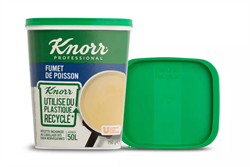 Unilever has partnered with Greiner Packaging and petrochemical company SABIC in a pilot project to manufacture tubs and lids for Knorr bouillon powder made from 100% certified circular polypropylene from post-consumer plastic material. Unilever expects the project to make about 1 million Knorr bouillon powder packages. The new, environment-friendly packaging will have the same outer appearance, functionality, and safety as the cardboard-plastic combination packaging Knorr bouillon powder has had for many years, the company said.[Image Credit: © Unilever plc]
Unilever has partnered with Greiner Packaging and petrochemical company SABIC in a pilot project to manufacture tubs and lids for Knorr bouillon powder made from 100% certified circular polypropylene from post-consumer plastic material. Unilever expects the project to make about 1 million Knorr bouillon powder packages. The new, environment-friendly packaging will have the same outer appearance, functionality, and safety as the cardboard-plastic combination packaging Knorr bouillon powder has had for many years, the company said.[Image Credit: © Unilever plc]
CAMPAIGNS, COMMITMENTS & NGOs
UK Plastics Pact Report Highlights Plastics Recycling Gains Made in 2019
.png&width=250&height=131) In the UK, plastic packaging dropped by 6% in 2019 from the previous year, according to The UK Plastics Pact Annual Report 2019-20. The report also said members are on target to remove six out of eight problematic or unnecessary items by the end of 2020, and members sold 400 million “problematic or unnecessary” items in 2019, down 40% from 2018. The study also found that of the plastic packaging members put on the market in 2019, 64% “continues to be recyclable”, but that urgent action is needed to make flexible plastic packaging recyclable more widely in the UK. The amount of plastic packaging recycled rose to 50% in 2019, from 44% in 2018, and the latest citizen survey found that 87% of households regularly recycle.[Image Credit: © WRAP]
In the UK, plastic packaging dropped by 6% in 2019 from the previous year, according to The UK Plastics Pact Annual Report 2019-20. The report also said members are on target to remove six out of eight problematic or unnecessary items by the end of 2020, and members sold 400 million “problematic or unnecessary” items in 2019, down 40% from 2018. The study also found that of the plastic packaging members put on the market in 2019, 64% “continues to be recyclable”, but that urgent action is needed to make flexible plastic packaging recyclable more widely in the UK. The amount of plastic packaging recycled rose to 50% in 2019, from 44% in 2018, and the latest citizen survey found that 87% of households regularly recycle.[Image Credit: © WRAP]
Arjowiggins’ New Transparent Paper Offers Cosmetics Industry Alternative To Plastic Packaging
 Arjowiggins has developed Sylvicta, a transparent paper that can be used for cosmetics packaging. The company says Sylvicta provides the cosmetics industry with a “sustainable, effective, and creative” alternative to plastic packaging. It was developed by the paper specialist company using a precision fiber refining technique to create organic bonding that serves as a barrier to oxygen, aroma, and oils, equalling the protection and preservation characteristics of plastic. Some of the paper’s applications include primary packaging for a range of cosmetic products, including soap bars and creams. Packaging creativity applications include the paper being foil-stamped, embossed, and coated with bio-wax to provide strength when wet.[Image Credit: © Arjowiggins ]
Arjowiggins has developed Sylvicta, a transparent paper that can be used for cosmetics packaging. The company says Sylvicta provides the cosmetics industry with a “sustainable, effective, and creative” alternative to plastic packaging. It was developed by the paper specialist company using a precision fiber refining technique to create organic bonding that serves as a barrier to oxygen, aroma, and oils, equalling the protection and preservation characteristics of plastic. Some of the paper’s applications include primary packaging for a range of cosmetic products, including soap bars and creams. Packaging creativity applications include the paper being foil-stamped, embossed, and coated with bio-wax to provide strength when wet.[Image Credit: © Arjowiggins ]
RecyClass Launches Certification Program For Recycled Plastics Content
 RecyClass has announced the official launch of the Recycled Plastics Traceability Certification, a program that certifies plastic products with recycled content. The program offers a “transparent and reliable approach” to measurement and assessment of material shares before and after consumer use of the products. Also, the program documents the origins and traceability of recycled materials, using the percentage-based calculation approach as defined by the Chain of Custody ISO 22095 and Recycled Plastics EN 15353:2006 standards.[Image Credit: © RecyClass ]
RecyClass has announced the official launch of the Recycled Plastics Traceability Certification, a program that certifies plastic products with recycled content. The program offers a “transparent and reliable approach” to measurement and assessment of material shares before and after consumer use of the products. Also, the program documents the origins and traceability of recycled materials, using the percentage-based calculation approach as defined by the Chain of Custody ISO 22095 and Recycled Plastics EN 15353:2006 standards.[Image Credit: © RecyClass ]
Consumer Brands Pay TerraCycle To Recycle Packaging, Including Those of Rivals
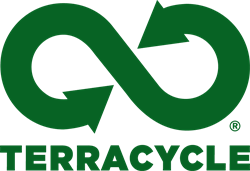 More than 20 consumer brands in Australia have signed deals with waste management company TerraCycle. These companies, which manufacture consumer products, such as haircare products, disposable razors, and toothbrushes, have agreed to sponsor recycling programs that involve collection and recycling of products and packaging. Recycling programs include packaging for products made by sponsoring companies’ competitors.[Image Credit: © TerraCycle]
More than 20 consumer brands in Australia have signed deals with waste management company TerraCycle. These companies, which manufacture consumer products, such as haircare products, disposable razors, and toothbrushes, have agreed to sponsor recycling programs that involve collection and recycling of products and packaging. Recycling programs include packaging for products made by sponsoring companies’ competitors.[Image Credit: © TerraCycle]
CONSUMER & PUBLIC OPINION
UK: Rural Lead Urban In Recycling And Sustainability Adoption
 In the UK, 90% of people who live in rural regions recycle their plastic, while 71% of urban dwellers do so, according to a consumer survey from the Institution of Engineering and Technology. Rural residents also tend to accept more environmental responsibility, with 63% saying individuals are responsible for dealing with climate change, while 50% of urban residents think so. Urban residents, however, outperform their rural counterparts on using green technology, including fitted solar panels (32% vs 9%), smart technology/digital assistants (42% vs 17%), and alternative gas heaters (37% vs 4%).The full report is available here.[Image Credit: © Institution of Engineering and Technology]
In the UK, 90% of people who live in rural regions recycle their plastic, while 71% of urban dwellers do so, according to a consumer survey from the Institution of Engineering and Technology. Rural residents also tend to accept more environmental responsibility, with 63% saying individuals are responsible for dealing with climate change, while 50% of urban residents think so. Urban residents, however, outperform their rural counterparts on using green technology, including fitted solar panels (32% vs 9%), smart technology/digital assistants (42% vs 17%), and alternative gas heaters (37% vs 4%).The full report is available here.[Image Credit: © Institution of Engineering and Technology]
Survey Shows Majority Of Scots Support Fees On Single-Use Plastic Packaging
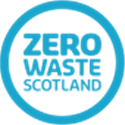 In Scotland, 66% of consumers said they would support introducing fees for single-use plastic items and packaging. Results of the survey for Zero Waste Scotland also revealed that 89% of respondents cited reducing harm to the marine environment as main reason for supporting the extra charge. Reducing litter and helping stop or reduce climate change were cited by 87% and 81% of respondents, respectively.[Image Credit: © Zero Waste Scotland]
In Scotland, 66% of consumers said they would support introducing fees for single-use plastic items and packaging. Results of the survey for Zero Waste Scotland also revealed that 89% of respondents cited reducing harm to the marine environment as main reason for supporting the extra charge. Reducing litter and helping stop or reduce climate change were cited by 87% and 81% of respondents, respectively.[Image Credit: © Zero Waste Scotland]
MARKET NEWS
Pandemic Lockdown Drives Surge In Plastic Recycling In UK
 The recycling rate of all UK household plastics packaging increased by 2% from April 2019 to March 2020, but it was up over 20% during the first lockdown period, according to plastics recycling charity RECOUP. Data from RECOUP’s UK Household Plastics Collection Survey show that changes in people’s lifestyles, including working from home, online schooling, and reduced travel, helped drive the increase in plastics packaging collection and recycling. [Image Credit: © RECOUP]
The recycling rate of all UK household plastics packaging increased by 2% from April 2019 to March 2020, but it was up over 20% during the first lockdown period, according to plastics recycling charity RECOUP. Data from RECOUP’s UK Household Plastics Collection Survey show that changes in people’s lifestyles, including working from home, online schooling, and reduced travel, helped drive the increase in plastics packaging collection and recycling. [Image Credit: © RECOUP]
PACKAGING REDESIGNS
Ellen MacArthur Foundation Publishes Guide On How To Avoid Plastic Waste
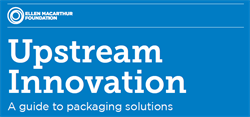 The Ellen MacArthur Foundation has published the “Upstream Innovation: A guide to packaging solutions,” a guidebook aimed at helping manufacturers get rid of plastic pollution with solutions based on circular economy concepts. The handbook offers many practical tips and real-world examples that can be implemented during the product design stage rather than focus on recycling and other downstream solutions. EMF say that through using this handbook, which includes an introduction to the mindset for upstream innovation, three key strategies, and advice on support and decision-making, businesses can prevent waste from being created in the first place. Also, the guide includes case studies from leading companies, including Tesco, Lush, and Walmart. The full report can be accessed here.[Image Credit: © Ellen MacArthur Foundation]
The Ellen MacArthur Foundation has published the “Upstream Innovation: A guide to packaging solutions,” a guidebook aimed at helping manufacturers get rid of plastic pollution with solutions based on circular economy concepts. The handbook offers many practical tips and real-world examples that can be implemented during the product design stage rather than focus on recycling and other downstream solutions. EMF say that through using this handbook, which includes an introduction to the mindset for upstream innovation, three key strategies, and advice on support and decision-making, businesses can prevent waste from being created in the first place. Also, the guide includes case studies from leading companies, including Tesco, Lush, and Walmart. The full report can be accessed here.[Image Credit: © Ellen MacArthur Foundation]
POLICY, REGULATION & LEGAL
UK Governments Partner With Industry Groups To Design Extended Producer Responsibility System
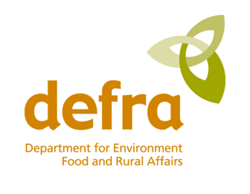 The UK’s Department for Environment Food & Rural Affairs (Defra) and its devolved counterparts in Northern Ireland, Scotland, and Wales have partnered with industry groups to develop a ready-made solution for a system of Extended Producer Responsibility modulated fees. The joint project, with the Industry Council for Packaging and the Environment, Food and Drink Federation, and the British Retail Consortium, will run until July 2021 and will examine how producers’ fees for packaging can be used to encourage expanded use of recyclable packaging. The partnership will also look at how possible higher fees can be applied to producers who do not use recyclable packaging.[Image Credit: © UK Government]
The UK’s Department for Environment Food & Rural Affairs (Defra) and its devolved counterparts in Northern Ireland, Scotland, and Wales have partnered with industry groups to develop a ready-made solution for a system of Extended Producer Responsibility modulated fees. The joint project, with the Industry Council for Packaging and the Environment, Food and Drink Federation, and the British Retail Consortium, will run until July 2021 and will examine how producers’ fees for packaging can be used to encourage expanded use of recyclable packaging. The partnership will also look at how possible higher fees can be applied to producers who do not use recyclable packaging.[Image Credit: © UK Government]
Loop Industries Says Independent Review Verifies Effectiveness Of Patented Recycling Technology
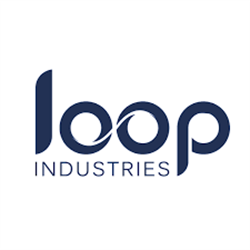 Loop Industries said Kemitek, a College Centre for Technology Transfer and a Canadian Technology Access Centre specializing in green chemistry, has independently verified its Gen II depolymerization technology, which allows the recycling of waste polyethylene terephthalate (PET) plastic and polyester fiber into virgin-quality PET resin made from 100% recycled content. The company said Kemitek used a “rigorous and independent methodology” to validate each step of the technology, the feedstock and the recycled PET resin. Pallets of post-consumer waste PET plastic were used as feedstock during the verification process.[Image Credit: © Loop Industries]
Loop Industries said Kemitek, a College Centre for Technology Transfer and a Canadian Technology Access Centre specializing in green chemistry, has independently verified its Gen II depolymerization technology, which allows the recycling of waste polyethylene terephthalate (PET) plastic and polyester fiber into virgin-quality PET resin made from 100% recycled content. The company said Kemitek used a “rigorous and independent methodology” to validate each step of the technology, the feedstock and the recycled PET resin. Pallets of post-consumer waste PET plastic were used as feedstock during the verification process.[Image Credit: © Loop Industries]
EMERGING: Corporate Plastic Accounting Rules Could Pressure Large Plastic Users
A group comprising 3R Initiative, Quantis, EA, and South Pole said it will release in early 2021 the Corporate Plastic Stewardship Guidelines framework, which aims to promote a circular economy for plastics and enable executives from large companies to improve how they measure actionable steps.
Draft Guidelines for Leadership in Corporate Plastic Accounting were made available for “broad public consultation” through November 8, 2020. They include detailed plans to implement a plastic accounting framework that would provide common definitions and measures and enable comprehensive plastic stewardship.
It is not clear whether the proposals will get traction. None of the four organizations seem to have international standing. It’s essentially a group of Swiss sustainable consulting ventures and each would look to generate business from a shift to plastic accounting, complicating their pitch.
Still, the move to tighter controls over plastic use looks certain and we will cover proposed guidelines when they are released in 2021.
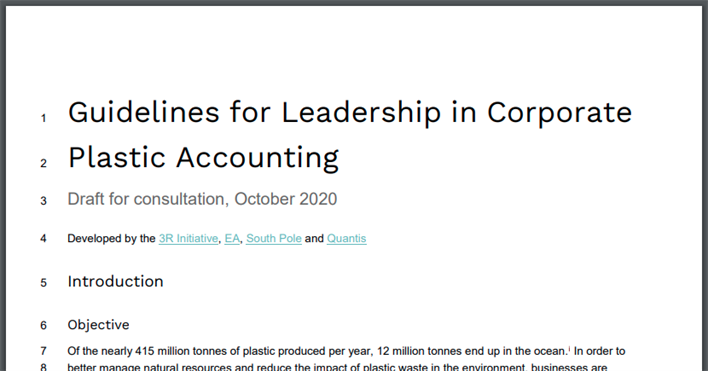 [Image Credit: © Verra ]
[Image Credit: © Verra ]
Draft Guidelines for Leadership in Corporate Plastic Accounting were made available for “broad public consultation” through November 8, 2020. They include detailed plans to implement a plastic accounting framework that would provide common definitions and measures and enable comprehensive plastic stewardship.
It is not clear whether the proposals will get traction. None of the four organizations seem to have international standing. It’s essentially a group of Swiss sustainable consulting ventures and each would look to generate business from a shift to plastic accounting, complicating their pitch.
Still, the move to tighter controls over plastic use looks certain and we will cover proposed guidelines when they are released in 2021.
 [Image Credit: © Verra ]
[Image Credit: © Verra ]
INNOVATION & TECHNOLOGY
Younger Consumers Push Demand For Environment-Friendly Packaging In China’s Beauty Market
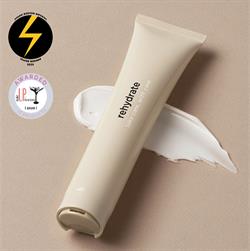
In China, younger consumers are driving demand for environment-friendly and sustainable packaging in the independent beauty industry. US-based packaging company WWP first launched in China 15 years ago and since then has seen changes in the market, including the emergence of local beauty brands. During the past two to three years, the company has seen an increase in numbers of companies asking about sustainable packaging. Recently, the company launched the Eco-Pac Tube, a packaging product made from 100% Bio-PE, a plastic resin derived from sugarcane.[Image Credit: © WWP]
Researchers Working With Bacteria To Create Plastics That Decompose In Seawater
 Jean-François Ghiglione, research director at the Oceanological Observatory in Banyuls, Pyrénées-Orientales, and his team of researchers have been studying how to use PHA polymers to make plastics that are biodegradable in seawater. Ghiglione’s research is focused on determining which types of bacteria are most effective for making PHA polymers and how various elements, including seawater, would affect them. Ghiglione said there are factors limiting industry interest in PHA polymers, including the cost of manufacturing them and the reluctance of industrialists who had invested significantly in first-generation biodegradable plastics that failed to live up to expectations.
Jean-François Ghiglione, research director at the Oceanological Observatory in Banyuls, Pyrénées-Orientales, and his team of researchers have been studying how to use PHA polymers to make plastics that are biodegradable in seawater. Ghiglione’s research is focused on determining which types of bacteria are most effective for making PHA polymers and how various elements, including seawater, would affect them. Ghiglione said there are factors limiting industry interest in PHA polymers, including the cost of manufacturing them and the reluctance of industrialists who had invested significantly in first-generation biodegradable plastics that failed to live up to expectations.[Image Credit: © UPMC]
MyPlasticDiary Wins Grant From Innovate UK’s Sustainable Plastics Solutions Fund
 Applications developer MyPlasticDiary has won a £50,000 grant from the Innovate UK’s Designing Sustainable Plastic Solutions funding competition. The grant is envisioned to help the company develop an app that will enable consumers to calculate their plastic footprint by adding up the amount of plastic packaging on products they use or consume. The company also plans to develop a service that links consumers’ plastic footprint to their online shopping activities.[Image Credit: © MyPlasticDiary ]
Applications developer MyPlasticDiary has won a £50,000 grant from the Innovate UK’s Designing Sustainable Plastic Solutions funding competition. The grant is envisioned to help the company develop an app that will enable consumers to calculate their plastic footprint by adding up the amount of plastic packaging on products they use or consume. The company also plans to develop a service that links consumers’ plastic footprint to their online shopping activities.[Image Credit: © MyPlasticDiary ]
OTHER NEWS
Circulate Capital Expands Investments In India’s Plastic Circular Economy
 Circulate Capital revealed that the Circulate Capital Ocean Fund will invest US$19 million in India-based waste management and recycling value companies Srichakra Polyplast, Rapidue Technologies, Deeya Panel Products, and Dalmia Polypro Industries. Circulate Capital established CCOF as an investment fund focused on fighting ocean plastic pollution in South and Southeast Asia. Among the corporate partners supporting the fund are PepsiCo, Procter & Gamble, Dow, Danone, Chanel, Unilever, and Coca-Cola Company. Circulate Capital previously announced investments in Lucro Plastecycle and Nepra Resources Management, bringing its total investments in India to US$39 million.[Image Credit: © Circulate Capital]
Circulate Capital revealed that the Circulate Capital Ocean Fund will invest US$19 million in India-based waste management and recycling value companies Srichakra Polyplast, Rapidue Technologies, Deeya Panel Products, and Dalmia Polypro Industries. Circulate Capital established CCOF as an investment fund focused on fighting ocean plastic pollution in South and Southeast Asia. Among the corporate partners supporting the fund are PepsiCo, Procter & Gamble, Dow, Danone, Chanel, Unilever, and Coca-Cola Company. Circulate Capital previously announced investments in Lucro Plastecycle and Nepra Resources Management, bringing its total investments in India to US$39 million.[Image Credit: © Circulate Capital]
TerraCycle’s Financing Round Raises $25 Million For Loop Global Holdings
 Recycling services company TerraCycle, founder and manager of Loop Global Holdings LLC, announced the completion of a Series A “Founding Investors” financing round that raised $25 million. The fund is to support Loop’s global reuse platform, towards profitability. Investors participating in the financing round include Procter & Gamble, Nestlé, SUEZ, Aptar, Sky Ocean Ventures, and Quadia.[Image Credit: © TerraCycle]
Recycling services company TerraCycle, founder and manager of Loop Global Holdings LLC, announced the completion of a Series A “Founding Investors” financing round that raised $25 million. The fund is to support Loop’s global reuse platform, towards profitability. Investors participating in the financing round include Procter & Gamble, Nestlé, SUEZ, Aptar, Sky Ocean Ventures, and Quadia.[Image Credit: © TerraCycle]
Copyright 2026 Business360, Inc.

